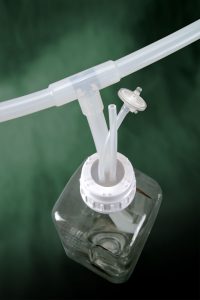
Like a chain, a biopharma transfer system depends on each of its links being strong enough to protect the integrity of the materials being transferred. In order to prevent problems associated with contamination, the system must be able to maintain a pure environment.
Container closures and stopper systems are sometimes seen as small items, but choosing the right components is vital. The impact of specifying the appropriate closure or stopper system can be felt throughout an entire fluid transfer process. Closure materials must be considered, a determination regarding tubing inserts must be made, and a host of other factors – filters, fitting styles, validations, service life, chemical compatibility, particulate concerns, temperatures, closure style availability – must be addressed. Another critical issue is repeated or single use. Research involving sterilization and costs must be conducted and decisions made.
Protecting your liquid transfer processes—and your investment in biopharmaceutical materials—often involves one of the easiest aspects to overlook or take for granted: closure and stopper systems.
Download this document to read about the challenges and considerations of container closure selection, the features and advantages the ideal closure system should offer, and how you can realize sizable benefits from these relatively small components.
